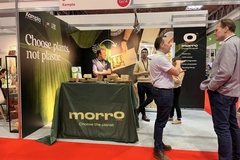
15 Mar 2019 --- British supermarket Asda has reportedly removed 6,500 tons of plastic from its own brand packaging since February 2018. The pressure to reduce the amount of plastic used in packaging has perhaps never been higher than it is right now. Through product innovation and redesign, Asda has reduced plastic in almost 1,000 individual product lines – from fresh fruit and vegetables to electronics and homewares – removing the equivalent weight of 600 million empty plastic bottles.
The news follow a Greenpeace and Environmental Investigation Agency (EIA) report from late last year that slated many UK supermarkets over their excessive plastic packaging use, noting that they have a stronger focus on recycling plastic over the reduction in the use of the material. The ten leading national supermarkets were reported as contributing over 810,000 tons of single-use plastics to the market every year.
Within the Greenpeace report, Checking out on Plastics, Asda was rated a 4.3 out of ten on its commitment to reduce single-use plastics, to eliminate non-recyclable plastics, their supply chain engagement and commitment to transparency.
The supermarket now shares that the starting point of its packaging designs will be “avoiding the use of unnecessary plastic.”
Some of the changes that have been implemented over the last 12 months include:
- Swapping family chilled ready meal trays from black plastic to foil.
- Changing pizza bases from non-recyclable polystyrene to fully recyclable cardboard.
- Replacing 5 million plastic bags on its bedding range with a cardboard band.
- Taking plastic covers off over 50 million greetings cards.
- Removing plastic windows and film from over 1.6 million mince pies at Christmas.
 Asda has reduced plastic in almost 1,000 individual product lines – from fresh fruit and vegetables to electronics and homewares.In August last year, the chain removed plastic wrapping for its swedes which was expected to result in a reduction of 14 tons of plastic per year.
Asda has reduced plastic in almost 1,000 individual product lines – from fresh fruit and vegetables to electronics and homewares.In August last year, the chain removed plastic wrapping for its swedes which was expected to result in a reduction of 14 tons of plastic per year.
Asda has also taken steps to make its packaging more recyclable, including changing all of its fresh product trays from black plastic to clear. These moves are in light of the supermarket's goal to make all of its packaging 100 percent recyclable by 2025.
The retailer is also working with industry bodies and relevant organizations to share best practice and develop new ideas. Asda is working with packaging experts at Leeds Beckett University, for example, to look for and assess alternative packaging materials. A report will be published later this year.
“Making changes of this scale in a business of this size is never easy, but I was clear last year that we needed to take a root and branch review of what packaging we use for our products,” says Roger Burnley, President and CEO of Asda. “Our customers expected this of us and while we’ve reached a major milestone, we know there is more that can be done and we are committed to making meaningful changes wherever possible. In many cases packaging is still essential to protect against waste but avoiding the use of unnecessary plastic will rightly be the starting point for all of our packaging designs in the future.”
However, November’s Greenpeace report highlighted that supermarkets had to better engage with their supply chains, as despite many supermarkets – such as Asda – making large strides among their own-brand packaging, branded goods can still make up 60 percent of a stores plastic footprint.
The survey identified that most companies are not engaging with brands over their plastic usage and noted that Sainsbury's has no policy in place on this topic, for example. The report suggests that companies leverage their buying power – saying “no” to brands that do not engage with plastic reduction commitments.
As the push to reduce plastic continues, a focus on other solutions could prove to be fruitful. Reusable models, for example, have been employed at some supermarkets, such as Morrisons, which was encouraging shoppers to bring their own plastic containers to the meat and fish counter.
While technologies can also serve to reduce the use of plastic in packaging, such as the so-called “natural label” from Laser Food. Dutch supermarket Jumbo launched this label on a range of its organic vegetables range, marking a move into the mainstream for the technology. The “natural label” is achieved through the use of laser technology that makes it possible to display the indication of “organic” directly onto the produce, without the need for additional packaging material. The method holds potential for further retailers who are looking to reduce plastic packaging and reduce their environmental footprint.
By Laxmi Haigh












